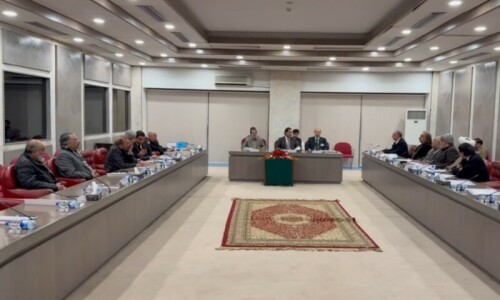PESHAWAR: Afzal Khan, affectionately called Khan Lala by party workers and supporters, was one of the last veteran Pakhtun nationalists, who continued to campaign for Pakhtun national unity -- uniting Pakhtuns on both sides of the Durand Line -- though many in his own Awami National Party had moved on to embrace ‘pragmatic’ politics to call for uniting the people in one administrative unit on this side of the border.
His last public political activity was at Peshawar’s Nishtar Hall in May, 2012, when ANP was ruling the roost in Khyber Pakhtunkhwa. Khan Lala had convened a ‘Qaami Jirga’ to agitate the death of over three million Afghans in the war-battered Afghanistan.
By his own acknowledgement, ANP did not initially agree to the concept of convening the jirga, which, he said, he had convened “as an Afghan individual.” “But now that it has decided to help organise the event, it is paying its dues,” he told the audience. “The party did not agree to it initially,” he said, bluntly with the then chief minister, Ameer Haider Khan Hoti and other ANP ministers in attendance.
And those who knew Khan Lala recalled that it was on his insistence that ANP agreed to amend its manifesto to incorporate ‘Pakhtun Milli Wahdat’ or national unity into it, when he agreed Afzal Khan Lala, the last champion of Pakhtun unity to rejoin the party in 2005.
It is believed that Khan Lala did not change his political philosophy even though the tumultuous events proceeding the capture of his native Swat valley by Taliban and the subsequent military operation to flush them out in 2009, brought the veteran politician incredibly close to the military establishment -- an institution the nationalists had come to despise and view with suspicion.
Khan Lala’s refusal to leave his ancestral land, his opposition to the army-backed peace agreement with Mulla Fazlullah-led Tehreek-i-Taliban Pakistan in Swat owing to what he believed was the unrepresentative character of the negotiating team and later lending full support to the military operation catapulted him to the spotlight.
A brave old man, Khan Lala earned the admiration of the army, when eventually GHQ did decide to eliminate militants from the scenic valley. From then on, he became a permanent fixture of all military events. He was accorded respect and protocol, not to mention the security he was given to protect his abode from constant onslaughts by Fazlullah’s men.
But Khan Lala did not seem to abandon his political philosophy. While he continued to enjoy respect and protocol from the men in Khaki, he continued to campaign for the unity of Pakhtuns.
His son Farooq Khan, who left his job at Ghulam Ishaq Khan Institute of Engineering Sciences and Technology, to stay with his father when militancy was at its peak in Swat, says that what his father did was for his people.
“My father staunchly believed in national unity but he also considered soldiers as sons of the nation,” said Farooq Khan, whose two elder brothers have served in Pakistan Army as a brigadier and a colonel.
Khan Lala was a towering figure. But he was a disappointed man, when his own party, he thought not only failed to bring about Milli Wahdat but also brought a bad name to its political legacy mired by allegations of corruption.
“Corruption was a term of the 19th century,” he would tell people, who would go to see him at his home. “This is the 21st century corruption, we need to come up with a new term for it,” he would say with a lament.
The last political man, who stood his ground against Taliban in his native valley, may have departed with a heavy heart at the way the Pakhtun nationalists failed to fulfil his dream of ‘Milli Wahdat’ in his lifetime.
But he may have been doubly disappointed that those he had shared meals and served time in prison as part of his political struggle and were his colleagues in the party did not show up at his funeral. The only exception was Ghulam Ahmad Bilour.
Khan Abdul Wali Khan once jokingly remarked: “Khan Lala, you tend to reach the funeral even before the poor man breathes his last.”
But his friends and supporters say that they were dismayed when the party chief Asfandyar Wali Khan left before his funeral took place, apparently due to security reasons. Arfasiab Khattak showed up on the second day of Khan Lala’s death, while Ameer Haider Hoti turned up for fateha on Sunday evening.
Published in Dawn, November 3rd, 2015
On a mobile phone? Get the Dawn Mobile App: Apple Store | Google Play














































